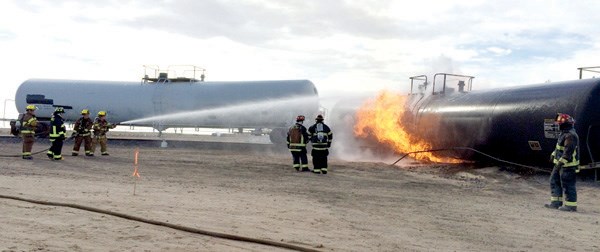(Submitted) - Two Weyburn firefighters recently returned from Pueblo, Colorado after attending a course sponsored and fully funded by Canadian Pacific Railway.
Platoon leaders Lindsey Leko and Kevin Cooke attended the Crude by Rail Emergency Response course taught at the Security and Emergency Response Training Center south of Pueblo, Colorado. Approximately 40 firefighters from across North America attended the course designed for the first responder to a major train derailment involving crude oil or other hazardous contents. The course covered topics including rail car design, hazards, product identification, tactics and fire suppression.
Leko, a 17-year-veteran and training officer with the fire department was marveled at the facility where the training took place.
"Basically it is a large base in the middle of the desert where all sorts of testing is done on rail cars, locomotives and other modes of transport" says Leko. "They have a good supply of equipment out there including various types of rail cars, tankers and learning aids all designed to help firefighters in the field."
Cooke, a 23-year-veteran of the fire department agreed and echoed Leko's observations.
"The staff out there were very knowledgeable and were extremely helpful to students taking the course. There was also a wide variety of experienced people out there taking the training as well, so it was sort of a big team effort," added Cooke.
The instructors simulated the burning of the rail cars as best they could with large propane fire simulators and alcohol based fuels because actual burning of crude oil is not allowed.
"It still got hot enough and the alcohol based fuels moved in puddles on the ground, so you really had to be aware of where you were standing and where the run-off was going," said Cooke.
Students controlled the fire with hand lines, large volume pumps and fire foam to eventually put the fire out.
"In reality, hand lines probably would not be used in derailments as crude oil burns much hotter than propane and firefighters would not get that close to rail cars that are on fire, but it seemed real enough," said Cooke.
It is important to have a plan for events such as this as the resources that go into it are huge.
"This is not the type of event where a fire department shows up with an 800 gallon fire truck and four pails of foam and expects to put the fire out," said Leko. "Planning has to go in place for large volumes of water, foam and other supplies depending upon where the fire is and what access is to the site."
Weyburn Fire Department has responded to rail emergencies in the past. One was a major derailment with a large fire near Ralph and they've also attended collisions between trains and vehicles.
The plan is to bring back this training to the rest of the members of the Weyburn Fire Department so that they have some basic awareness of derailment emergencies. Plans are also being made to provide a training day with departments such as Yellow Grass, Midale, Fillmore, Stoughton and Sedley, to name a few, as they have rail lines hauling crude oil going through their communities. The Weyburn Fire Department will contact CP Rail so that they can plan something major and have the equipment necessary to do it properly.
When asked what stood out during their time in Pueblo, both Weyburn firefighters had different answers.
"The amount of energy stored in metal under pressure on railcar derailments is incredible," said Cooke. "You may attend a derailment and find twisted and bent metal everywhere, but you always have to be aware that this metal has a memory and if it lets go or is cut, it will immediately spring back to its original shape and form which is a definite danger for any person standing close to it."
Leko was surprised at the amount of water and foam needed to cool and extinguish a crude oil fire. "It may take hours of pouring water on these rail cars, cooling them off enough so that the foam can work and suppress flammable vapors and eventually put the fire out," he said.
The Weyburn Fire Department hopes to send members away for future training in rail car fires, big truck rescues, MVA extrication courses and incident command courses. This training will make the department better prepared to handle any emergency that it may find in the response area.



